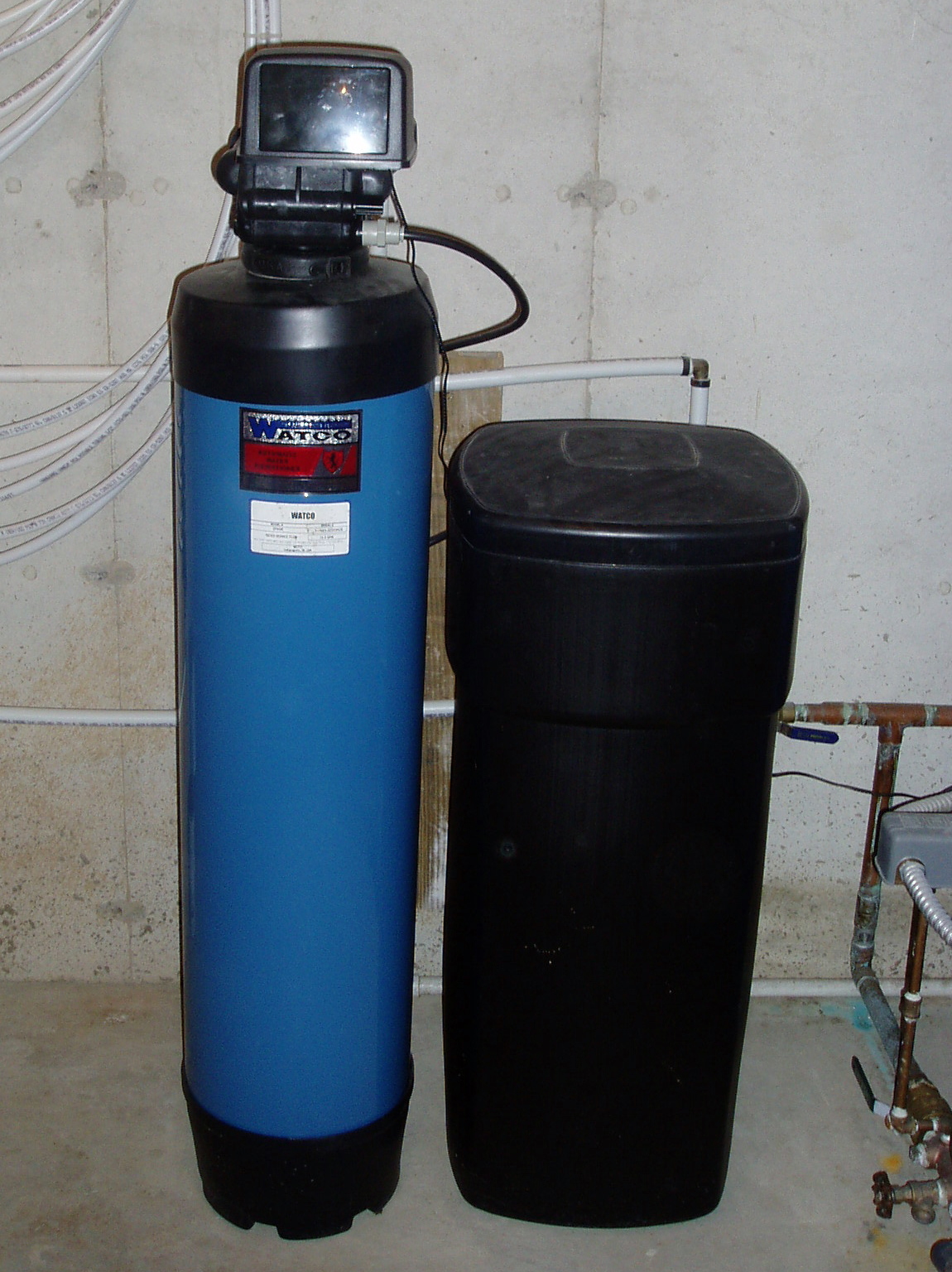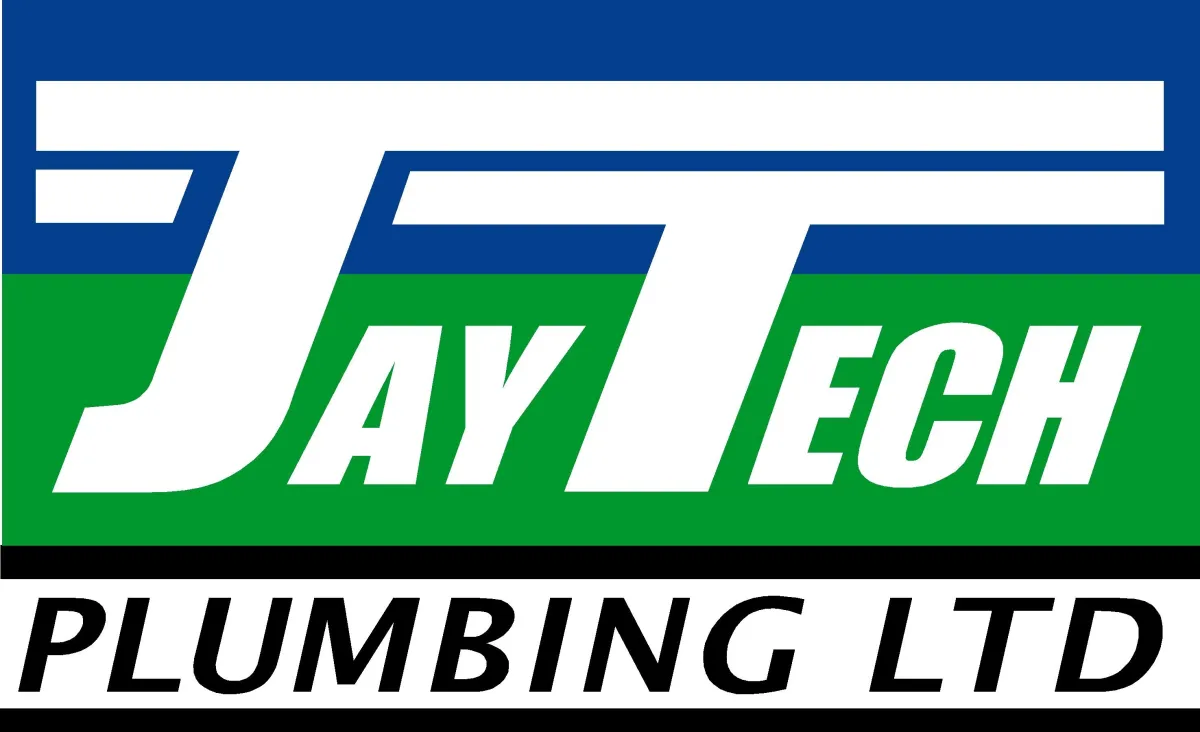
Water Softeners - Jaytech Plumbing | Guelph Plumber
Water Softeners
Water softeners are used to reduce the grains per gallon(gpg) level in hard water. Having hard water does not mean you need one however it can be a good investment. Hard water not only can cause build-up in various appliances and pipes (such as your water heater) but the effects can be seen elsewhere in the home as well.
While you may want softer water for washing dishes, showering, and other uses it is not recommended for drinking, cooking, or watering plants. The minerals (calcium and magnesium) that make water ‘hard’ are beneficial to your health. Water is softened by the replacement of these elements. ‘Softened’ water contains higher salt content because of this and therefore is not great for cooking, drinking or plants. This is easily avoided but having a bypass valve installed with your softener
How They Work

internal diagram of a water softener
Most water softening systems work through ion exchange. There are a couple other options but none that work as effectively and efficiently as ion exchange.
In an ion exchange system, the calcium and magnesium ions are exchanged for salt ions. The water flows through a tank that contains resin beads covered in salt ions. This is where the exchange happens. As more water is softened and the resin beads lose their salt ions they are recharged by adding salt to the tank. This process is basically the same as softening but it happens in reverse. All excess minerals (the calcium and magnesium) are then rinsed into the wastewater drain.
Water Softener Salts
There are three different forms of salt that can be used for water softening as well as an alternative to salt.
Rock Salt – Cheapest option but has more insoluble material.
Solar Salt – Produced by evaporation of seawater. Cleaner that Rock salt.
Evaporated Salt – Refined, purified salt like table salt. Cleaner than Rock salt.
Potassium Chloride – Not a water softener salt but can be used to replace salt if you are concerned about salt in your drinking water. May not be safe for all water softeners though. Is more expensive but works the same way as salt.
Choosing the option that works best for you may depend on what type of water softener you have and how much it is going to be used. For the average homeowner rock salt will work fine but if it’s for a business the excess minerals rock salt produces may cause build-up.
Timer vs. Demand Water Softeners
Water softeners work one of two ways: on a timer or by demand. When a water softener works on a timer, it recharges the resin beads on a schedule even if they don’t need it. This can result in wasted salt especially during times of little use such as during vacation. In an ‘on-demand’ system, the resin beads are only recharged when they need it.
Softener Size
The size of softener needed for a household is determined by the number of gpg that needs to be removed daily for the household. This is done through the following calculation:
Number of people in the house x average daily water consumption per person (in gallons) x gpg = grains of hardness that need to be removed daily
Daily Grain Removal RequirementsSuggested Softener Size0 – 3,500 grains per day24,000 grain capacity3,501 – 4,500 grains per day32,000 grain capacity4,501 – 5,750 grains per day40,000 grain capacity5,751 – 6,850 grains per day48,000 grain capacity
For example for a 2 person household in Guelph, ON with a water hardness of 22gpg and an average person consuming 44 gallons/day:
2 people x 44 gallons = 88 gallons/day
88g x 22gpg = 1,936 grains per day.
For this house a 24,000 grain capacity will be sufficient.
If you want to be more accurate in your calculations, pull out your water bill and follow this calculation:
Recorded fall or winter* bill of water consumption in cubic metres(M3) / # of billing days in that period = average daily water use
Average daily water use x 264 = average daily water use in gallons.
*Don’t use summer water consumption as it will be higher that usual due to outside activities such as watering plants and washing vehicles.
To find your water hardness there are a few different options from ‘Googling’ it to having your water tested.
What Softener to Buy?
When choosing a water softener the main thing you want to look for is efficiency. Look to see if it’s NSF/ANSI 44 performance standard certified. This certification is voluntary but points to an efficient softener. You should also compare the performance data which you may be able to find online or you can request it from the manufacturer. Talking to your local plumber is also a great idea.
If you still have questions about water softeners, hard water, or anything related comment below. We’d love to help out! We are your local Guelph water softener plumbers.
